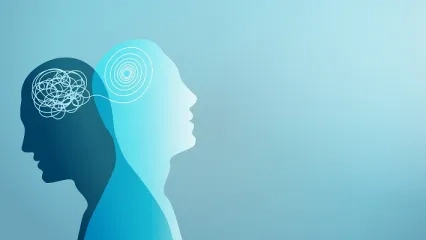Alo Yeditepe
Alo Yeditepe
9 Different Types of Depression
Yeditepe University Hospitals Psychiatrist Assoc. Prof. Dr. Serhat Tunç explained the different types of depression under the guidance of clinical guidelines.
1.Major Depressive Disorder (Unipolar Major Depression)
A major depressive episode is manifested by having at least 5 of the following 9 symptoms for at least 2 weeks.
One of the symptoms should be either feeling depressed and unhappy, or a loss of interest in loved activities.
- Feeling down and unhappy most of the day
- Decreased or complete loss of interest in most or all of the activities that the person normally enjoys
- Decreased or increased sleep compared to normal sleep routine
- Decreased appetite, significant weight loss, or increased appetite, weight gain
- Slowing or agitation that can be observed by others
- Fatigue or decrease in energy
- Decreased ability to concentrate, think or make decisions
- Thoughts of worthlessness or excessive or inappropriate guilt
- Repeated thoughts of death or suicide or attempted suicide.
Note: In order to call it major depression, symptoms must not be due to a substance or a general medical condition. In addition, complaints should cause deterioration in the efficiency and functionality of the person with significant distress.
2.Chronic Depression (Dysthymia)
- Have at least 3 of the following symptoms for at least 2 consecutive years. One of the symptoms should be feeling depressed and unhappy:
- Feeling down and unhappy most of the day
- Decreased or increased appetite for most days
- Decreased or increased sleep compared to normal sleep routine
- Fatigue or decrease in energy
- Decrease in self-worth
- Impaired concentration or decision making
- Hopelessness.
Note: Symptoms are not as severe as in major depression. There may be periods without symptoms during the course of chronic depression, but this period may not exceed 2 consecutive months over a period of 2 years (or longer). Chronic depression, along with significant distress, causes impairment in a person's productivity and functionality.
3.Depression in Bipolar Disorder
In bipolar disorder, formerly known as' manic-depressive disorder ', the patient is caught between two different mood states (mania and depression). During the mania period of the disease, there are symptoms such as insomnia, excessive cheerfulness, excessive mobility. During the depression period, classic depression symptoms such as unhappiness, depression, and decreased interest in loved activities are seen. If there is a history of mania or hypomania (a milder form of mania) in patients presenting with depressive symptoms, the diagnosis is bipolar depression. If there is no history of mania or hypomania, the diagnosis is major depression.
4.Seasonal Depression
It refers to the fact that the onset of major depressive episodes in the last 2 years coincides with a certain time of the year. In addition, the control of the disease occurs at a certain time of the year, for example, the periods can begin in the fall and end in the spring.
5.Pregnancy-Related Depression
It refers to the onset of an episode of depression during pregnancy or within 4 weeks of giving birth.
6.Psychotic Depression
Psychotic traits include delusions (false beliefs) and hallucinations (false sensory perceptions) that can occur at any time during a depressive episode.
7.PMS Depression
It is manifested by emotional and behavioral symptoms that appear during the week before the onset of menstruation and regress with the onset of menstruation or a few days after the onset of menstruation. It negatively affects the person's quality of life.
8.Non-Typical Depression (Atypical Depression)
Have at least 3 of the following symptoms during the depressive period. At least one of the symptoms is feeling better in positive events that you will enjoy:
- Feeling better about positive events you will enjoy
- Increased appetite or weight gain
- Excessive sleep according to normal sleep routine (for example, sleeping at least 10 hours a day or sleeping at least two hours more than normal when not depressed)
- The pattern of long-standing interpersonal rejection sensitivity that causes social or professional conflicts (i.e., feeling deep anxiety, humiliation, or anger at the slightest rejection from others).
9.Melancholic Depression
Have at least 3 of the following symptoms during the depressive period. At least one of the symptoms is either loss of pleasure or lack of response to positive stimuli.
- Decreased or inability to enjoy most or all of the activities that the person normally enjoys
- Not being able to feel better even in positive events that you will usually like
- Feeling depressed and unhappy, manifested by deep despair or pessimism
- Waking up early in the morning (for example, 2 hours before normal waking time)
- Inactivity or agitation (restlessness)
- Anorexia or weight loss
- Excessive guilt feeling.
Press Coverage: posta
About
Faculty and Year of Graduation:
Yeditepe University Faculty of Medicine, 2006
”
See Also
- What is Autism Spectrum Disorder?
- What is Mythomania (Pathological Lying Disorder)? What Causes Mythomania?
- What are the symptoms of a Panic Attack? How to Overcome a Panic Attack?
- What Does Narcissist Mean? Narcissistic Personality Disorder
- What is Anxiety? What are the Symptoms of Anxiety?
- The Father-Child Relationship Reflects on Personality Traits
- How Can We Manage Stress?
- Chronic Pelvic Pain
- Father's Role in Child Development is Fatal
- What is Agoraphobia?
- Developmental Disorders in Children
Alo Yeditepe




